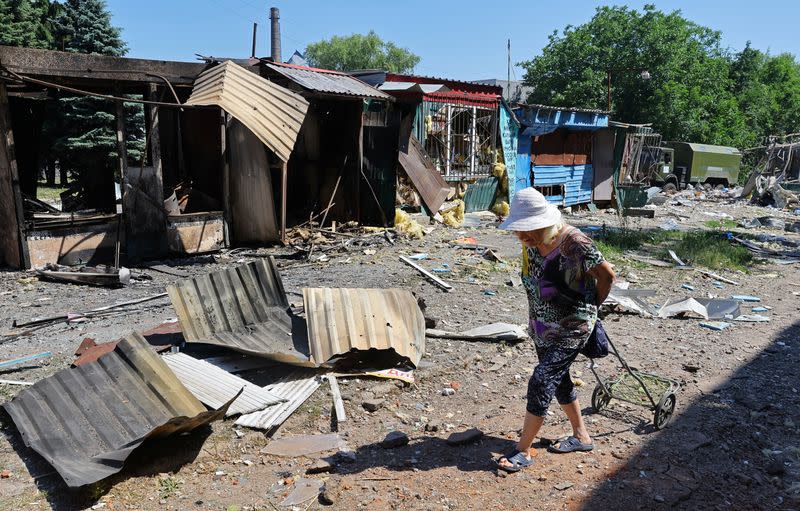Ukraine and Russia: What you need to know right now
(Reuters) - Ukrainian President Volodymyr Zelenskiy predicted Russia will escalate attacks this week as European Union leaders consider whether to back his country's bid to join the bloc and Russia presses its campaign to win control of eastern Ukraine.
The EU's embrace of Ukraine would interfere with one of Russian President Vladimir Putin's stated goals when he ordered his troops into Ukraine: keep Moscow's southern neighbour out of the West's sphere of influence.
FIGHTING
* Luhansk regional Governor Serhiy Gaidai told Ukrainian TV "all Russian claims that they control (Sievierodonetsk) are a lie. They control the main part of the town, but not the whole town". Fighting made evacuations from the city impossible, he said.
* Britain's Ministry of Defence said both Russia and Ukraine have continued heavy bombardment around Sievierodonestk "with little change to the front line".
* Analysts at the Washington-based Institute for the Study of War think tank wrote that "Russian forces will likely be able to seize Sievierodonetsk in the coming weeks, but at the cost of concentrating most of their available forces in this small area".
* In Ukraine's second largest city Kharkiv, northwest of Luhansk, Russia's defence ministry said its Iskander missiles had destroyed weaponry recently supplied by Western countries.
* The governor of Russia's Bryansk region said the border village of Suzemka had been shelled from northern Ukraine, and one person was wounded and a power station was damaged.
* In southern Ukraine, Western weaponry had helped Ukrainian forces advance 10 km (6 miles) towards Russian-occupied Melitopol, its mayor said in a video posted on Telegram from outside the city.
* Reuters could not independently verify battlefield reports.
DIPLOMACY* NATO Secretary-General Jens Stoltenberg said the war in Ukraine "could take years" and the West must continue its support, Germany's Bild am Sonntag newspaper reported.
ECONOMY
* European Union foreign ministers will discuss ways to free millions of tonnes of grain stuck in Ukraine due to Russia's Black Sea port blockade at a meeting in Luxembourg on Monday.
* Germany announced its latest steps to boost gas storage levels to prepare for the next winter season, when it fears Russia, which has cut deliveries in recent days, could reduce or even completely halt supplies.
(Compiled by Cynthia Osterman and Mark Heinrich)

